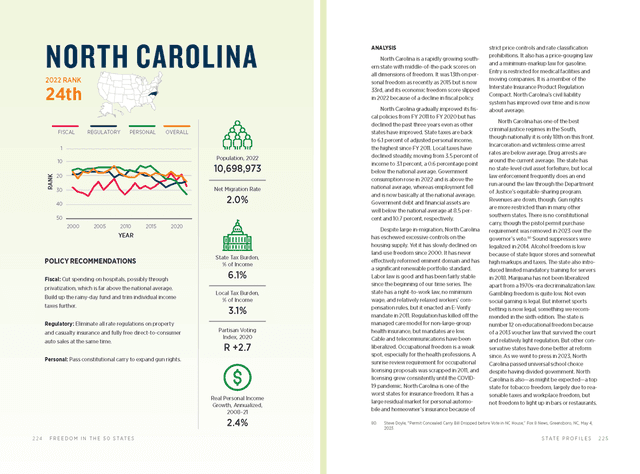Policy Recommendations
- Fiscal Cut spending on hospitals, possibly through privatization, which is far above the national average. Build up the rainy-day fund and trim individual income taxes further.
- Regulatory Eliminate all rate regulations on property and casualty insurance and fully free direct-to-consumer auto sales at the same time.
- Personal Pass constitutional carry to expand gun rights.
Analysis
North Carolina is a rapidly growing southern state with middle-of-the-pack scores on all dimensions of freedom. It was 13th on personal freedom as recently as 2015 but is now 33rd, and its economic freedom score slipped in 2022 because of a decline in fiscal policy.
North Carolina gradually improved its fiscal policies from FY 2011 to FY 2020 but has declined the past three years even as other states have improved. State taxes are back to 6.1 percent of adjusted personal income, the highest since FY 2011. Local taxes have declined steadily, moving from 3.5 percent of income to 3.1 percent, a 0.6 percentage point below the national average. Government consumption rose in 2022 and is above the national average, whereas employment fell and is now basically at the national average. Government debt and financial assets are well below the national average at 8.5 percent and 10.7 percent, respectively.
Despite large in-migration, North Carolina has eschewed excessive controls on the housing supply. Yet it has slowly declined on land-use freedom since 2000. It has never effectively reformed eminent domain and has a significant renewable portfolio standard. Labor law is good and has been fairly stable since the beginning of our time series. The state has a right-to-work law, no minimum wage, and relatively relaxed workers’ compensation rules, but it enacted an E-Verify mandate in 2011. Regulation has killed off the managed care model for non-large-group health insurance, but mandates are low. Cable and telecommunications have been liberalized. Occupational freedom is a weak spot, especially for the health professions. A sunrise review requirement for occupational licensing proposals was scrapped in 2011, and licensing grew consistently until the COVID-19 pandemic. North Carolina is one of the worst states for insurance freedom. It has a large residual market for personal automobile and homeowner’s insurance because of strict price controls and rate classification prohibitions. It also has a price-gouging law and a minimum-markup law for gasoline. Entry is restricted for medical facilities and moving companies. It is a member of the Interstate Insurance Product Regulation Compact. North Carolina’s civil liability system has improved over time and is now about average.
North Carolina has one of the best criminal justice regimes in the South, though nationally it is only 18th on this front. Incarceration and victimless crime arrest rates are below average. Drug arrests are around the current average. The state has no state-level civil asset forfeiture, but local law enforcement frequently does an end run around the law through the Department of Justice’s equitable-sharing program. Revenues are down, though. Gun rights are more restricted than in many other southern states. There is no constitutional carry, though the pistol permit purchase requirement was removed in 2023 over the governor’s veto. Sound suppressors were legalized in 2014. Alcohol freedom is low because of state liquor stores and somewhat high markups and taxes. The state also introduced limited mandatory training for servers in 2018. Marijuana has not been liberalized apart from a 1970s-era decriminalization law. Gambling freedom is quite low. Not even social gaming is legal. But internet sports betting is now legal, something we recommended in the sixth edition. The state is number 12 on educational freedom because of a 2013 voucher law that survived the court and relatively light regulation. But other conservative states have done better at reform since. As we went to press in 2023, North Carolina passed universal school choice despite having divided government. North Carolina is also—as might be expected—a top state for tobacco freedom, largely due to reasonable taxes and workplace freedom, but not freedom to light up in bars or restaurants.

